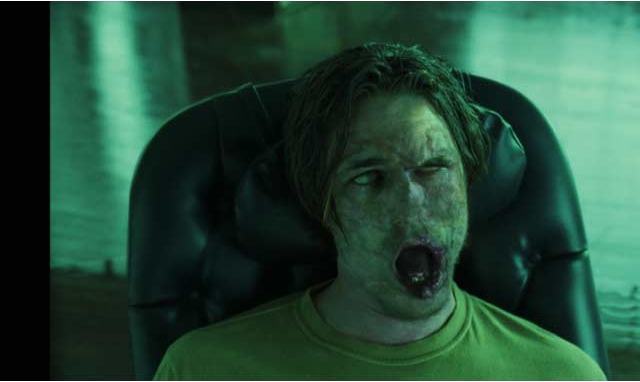Earlier this week, an article about a study run by the NIH surfaced on GameSpot saying that violent images reduce "reactions" to violent imagery in teenagers. The title of the article was a bit misleading to me (I believed it meant "emotional responses" in regards to ALL social interaction,) but it garnered a lot of attention on the site and raises some interesting points. For that full article, check it out here.
Violent images 'blunt' emotional responses in teens
NOTE: THIS ARTICLE WILL CONTAIN DESCRIPTIONS OF VIOLENCE AND IS NOT INTENDED FOR THE SQUEAMISH. HOWEVER, ALL VIOLENCE DESCRIBED IS PURELY PRESENT FOR EDUCATIONAL OR ELABORATIVE PURPOSES.

Oh my goodness, who turned off safesearch on my computer? DO NOT type "teens playing violent video games" into Google images. Unless you're into that sort of thing, of course.
Now, there are three issues I'd like to raise with this test.
1) No "extremely" violent images were displayed.
2) No context was given for the violent imagery other than that it was "real."
3) The study was actually about violent media in general, not just video games.
Now, there's a whole lot to say about each of these issues, so let's take them all one at a time.
1) No "extremely" violent images were displayed.
Unfortunately, violence is not rated upon a scale. While violence is measurable to other violence (say, a broken nose versus being drawn and quartered,) it's not as if one act of violence can be rated, say, a 7.5 out of 10.They had previously defined "extremely violent" movies as including "I Know What You Did Last Summer", "Scream II", and "Die Hard." Only one section of Die Hard bothers me, really, and it's not one where violence is commited; it's one where John McClane's trying to recover.
Violence is HIGHLY subjective to begin with and reactions to violence are part of the individual psychosis. For example, I find it far more violent to be stabbed than one of my friends, who would argue that the most violent act you could do to her is pluck her eyes out. As a result, I don't respond well to people holding knives, while she doesn't respond well to anyone putting anything near her face. The latter doesn't bother me at all, however. This is an example of the subjectiveness of violence, and what images are considered extreme to what people.

This image from The Ring may be extremely grotesque and bothersome to many people, but I found nothing in the film to be violently disturbing.
Because of the number of violent images within the test (114, each about four seconds long), it is really unnecessary (and would be in bad taste) to list all of the images they showed during the test. However, they did include a few examples, including "Street brawls, fist fights, and stadium violence" (see 'Stimuli' in the full text of the experiment.) To me, this would be bothersome in real life, but I don't thing anyone is bothered by seeing a fist fight on television. It's unfortunate, of course, but unless there's something more behind it, it's really nothing very disturbing. Which brings me to my next point.
2) No context was given for the violent imagery other than that it was "real."
Violence, in and of itself, is not that disturbing. When the driving emotional force behind an act of violence is not given, it makes a statement about human nature, but not one that is otherworldly; animals, of course, commit acts of violence regularly out of dominance, survival instinct, and instinctive distaste for each other. However, an act of violence with meaning behind it can give us a lot more. Violence stemming from racism can be as minor as a rubber ball being thrown at someone; any act of racist violence (or even verbal racist violence) incites a large emotional response out of people, as does violence from war, from discrimination, from lust, and from profit.
Without any context, this image of impending violence (taken from "The Wall") loses a lot of its power. (Though observant onlookers can find some context within the image itself, I figure.)
I would even go so far to say that "real" violent imagery without any context, or violent images that occur out of drunken anger, are less real to me than some of the violence that does occur in video games. For example, the terrorist level in "Call of Duty: Modern Warfare 2" was very real to me; it pulled me out a bit once I realized the terrorists I was pretending to have joined wouldn't turn on me if I didn't fire upon civilians, but up until that point, the emotional context was there, and as it was for many players, it was jarring and effective. The Metal Gear Solid series puts profit and jealousy out at the forefront of violence, making the battles between characters emotionally gripping. They give context to violence that makes it more than just anger.
Context is what gives violence its power; without context, you might as well be watching the UFC. Of course, violence, even without personal emotions, can be very real as well. While an image of random people fighting over which team they support is disappointing, a scene like the opening of "Saving Private Ryan" is instantly effective. War films have an instantly recognizable representation; wars are fought over disagreements in beliefs, profit, and paranoia. This scene, in particular, uses extreme violence and our instant emotional with the "good guys" of World War II to set up an emotionally powerful scene of Hollywood violence, garnering a reaction that even much real violence does not elicit. This scene also uses our emotional connection with the good guys to make us feel a betrayal near the end of this scene, where two soldiers kill Germans who have surrendered after taunting them. Speaking of movies…
3) The study was about violent media in general, not just video games.
What the hell? Wait, but the article said…
" We conclude that aggressive media activates an emotion–attention network that has the capability to blunt emotional responses through reduced attention with repeated viewing of aggressive media contents, which may restrict the linking of the consequences of aggression with an emotional response, and therefore potentially promotes aggressive attitudes and behavior." – Abstract, " Fronto-parietal regulation of media violence exposure in adolescents: a multi-method study"
GameSpot…why are we egging this behavior on? No, really, this needs to stop. How do you think we wind up with lawyers like Jack Thompson in the first place?

"It's the video games, I tells ya!"
This study really isn't even our fight to begin with; it's an extension of multiple studies taken over the last ten years that have indicated consequences (or not) of increased exposure to violent media. If we choose to make every statement about violent media about video games instead, this is NOT going to help win over those against violent video games (such as the Australian C. Board, sorry I can't include the full name) or support gaming against those legislators who would censor it.
If gaming is going to become an art form and be accepted in the public eye, we need to stop egging on studies that tell us we're emotionless killing machines who celebrate a medium of no artistic merit. I understand GameSpot's duty as journalists is to report and not necessarily to be active in the defense of games, but I still don't understand why we would willingly take all the blame for the fight against violent media.
The study still makes an interesting point, however; video games are still a form of media, and apparently exposure to violent media dulls our responses to some of the world's real violence. As I said above, I'm not so sure this is an inherently bad thing. Older cultures such as the Sumerians, the Spartans, the Persians, the Romans, and so on have carried much more violence in their political systems than we do today to the level of public executions (then much more violent than today), and society hasn't been lost yet. I understand the fear behind this study, however; overexposure to violence in the media could, hypothetically, desensitize us to real-world violence of a more significant kind.
But I believe so long as violent media gives us context behind the violence and saves the extreme violence for truly powerful moments, there's nothing to fear, and senseless violence will eventually fade out of the artistic medium, having lost much of its power.


Log in to comment